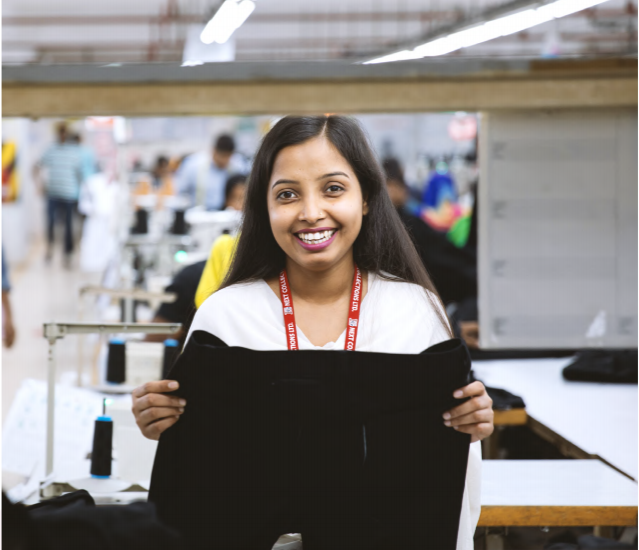Investing in women everywhere
March 31, 2020 | By Shamina SinghMeet Moshrefa Banu, a 25-year-old quality inspector in the sewing section of a garment factory in Dhaka, Bangladesh. She is married and has a young daughter who stays with Moshrefa’s parents in her home village while she works in the city. Moshrefa dreams of one day providing her family with a home of their own. Clouding her dreams are the everyday worries of balancing saving and spending — especially when she doesn’t have a secure place to save her money.

Moshrefa is among the more than 40 million workers employed in the garment industry in Asia. Women comprise the vast majority of front-line factory workers and are rarely promoted off of the line into management positions. On payday, women are paid in cash. They usually hand over a significant portion to the men in their lives to spend how they see fit, rather than use it to pay for the family-centered priorities the women may have.
Using digital technology to change the way workers get paid offers the opportunity to help shift household spending, advance financial inclusion and help people remain resilient during emergencies, which is critical now as workers around the world face growing economic uncertainty in the wake of the COVID-19 pandemic.
Recently, Moshefra started receiving her wages in a digital bank account, along with financial training using a gamified tech learning tool developed by BSR’s HERfinance program and the Mastercard Center for Inclusive Growth. “I didn’t know how to use [mobile money] until we had the [HERfinance] training,” said Moshrefa. “I can be more responsible with money now. I can save some of my wages in my mobile money account and can earn interest.”
Building on the lessons from HERfinance in Bangladesh, Mastercard has partnered with several major global brands, including Levi’s, VF Corporation and Marks & Spencer, to help empower garment workers financially and accelerate the transition to digital wages.
Our work in the garment industry is just one of the many ways Mastercard is working to help women thrive and stay resilient in the face of crisis. We’re pushing our networks further, forging ambitious partnerships and championing the people, businesses and innovations to build more inclusive economies.
This includes harnessing digital technology to permanently close the persistent 9% gender gap in financial inclusion. But first, we need technology that works for women.
In the U.S., Mastercard has worked with Grameen America to transition low-income women entrepreneurs to digital banking to help them stay competitive in an increasingly cashless society. Mastercard, in partnership with Citi and Apple, has provided support for Grameen America to digitally disburse loans and transform their back-end systems to scale their operations to reach more than 129,000 women.
Globally, we are collaborating with organizations like Accion and CARE to help micro and small businesses access the tools and services they need to thrive in the digital economy. Together, we aim to drive long-term financial security for these entrepreneurs in good times and bad.
Our commitment to increasing opportunities for women in the digital economy extends beyond financial inclusion to helping women and girls access the jobs of today and tomorrow.
Through our signature Girls4Tech program, we provide mentorship and education to encourage girls around the world to take interest and participate in STEM activities. So far, we have reached more than 800,000 girls in 27 countries, surpassing our goals.
As the COVID-19 pandemic continues to affect millions globally, we recognize that underserved populations will be among the hardest hit by the health and economic impacts of this global crisis.
This includes the increasing numbers of women who are on the front lines in the fight against the outbreak. Women make up the majority of healthcare workers, and are bearing much of the responsibility for caregiving as children stay out of school for months and relatives fall ill.
Together with the Bill & Melinda Gates Foundation and Wellcome, we have committed $125 million in seed funding to speed up the response to the COVID-19 epidemic by identifying, assessing, developing and scaling up treatments that are affordable and accessible to patients everywhere.
Our mission is to connect and power an inclusive digital economy that works better for women and creates limitless possibilities for us all. It’s a world that gives everyone the chance to unleash their potential.
